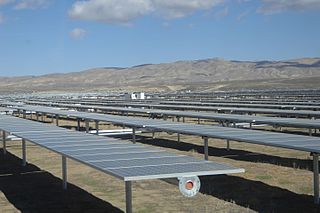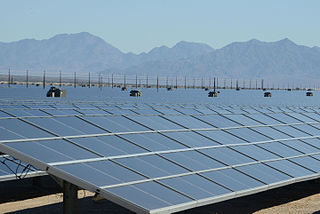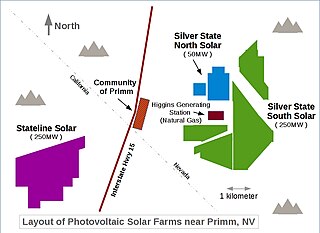
There are several solar power plants in the Mojave Desert which supply power to the electricity grid. Insolation in the Mojave Desert is among the best available in the United States, and some significant population centers are located in the area. These plants can generally be built in a few years because solar plants are built almost entirely with modular, readily available materials. Solar Energy Generating Systems (SEGS) is the name given to nine solar power plants in the Mojave Desert which were built in the 1980s, the first commercial solar plant. These plants have a combined capacity of 354 megawatts (MW) which made them the largest solar power installation in the world, until Ivanpah Solar Power Facility was finished in 2014.

Spain is one of the first countries to deploy large-scale solar photovoltaics, and is the world leader in concentrated solar power (CSP) production.

The California Valley Solar Ranch (CVSR) is a 250 megawatt (MWAC) photovoltaic power plant in the Carrizo Plain, northeast of California Valley. The project is owned by NRG Energy, and SunPower is the EPC contractor and technology provider. The project constructed on 1,966 acres (796 ha) of a 4,365-acre (1,766 ha) site of former grazing land. It is utilizing high-efficiency, crystalline PV panels designed and manufactured by SunPower. The project includes up to 88,000 SunPower solar tracking devices to hold PV panels that track the sun across the sky.

Solar power in California includes utility-scale solar power plants as well as local distributed generation, mostly from rooftop photovoltaics. It has been growing rapidly because of high insolation, community support, declining solar costs, and a Renewable Portfolio Standard which requires that 33% of California's electricity come from renewable resources by 2020, and 60% by 2030. Much of this is expected to come from solar power via photovoltaic facilities or concentrated solar power facilities.

Solar power in Arizona has the potential to, according to then-Governor Janet Napolitano, make Arizona "the Persian Gulf of solar energy". In 2012, Arizona had 1,106 MW of photovoltaic (PV) solar power systems, and 6 MW of concentrated solar power (CSP), bringing the total to over 1,112 megawatts (MW) of solar power. As an example, the Solana Generating Station, a 280 MW parabolic trough solar plant, when commissioned in 2013, was the largest parabolic trough plant in the world and the first U.S. solar plant with molten salt thermal energy storage.

Sierra SunTower was a 5 MW commercial concentrating solar power (CSP) plant built and operated by eSolar. The plant is located in Lancaster, California. As of mid-August, 2018, the two towers that were the center of the facility are no longer standing. The plant, however, is still present.
The Blythe Mesa Solar Power Project, also known as the Blythe Solar Energy Center, is a 485 megawatt (MWAC) photovoltaic power plant near the city of Blythe in Riverside County, California. It occupies about 2,000 acres of public land managed by the Bureau of Land Management in the Mojave Desert. The construction uses CdTe thin film panels from the U.S. firm First Solar, and the majority of the output is being sold to Kaiser Permanente and Southern California Edison under 20-year power purchase agreements.
The 21 megawatt Blythe Photovoltaic Power Plant is a photovoltaic (PV) solar project in California. It is located in Blythe, California, in Riverside County about 200 miles (320 km) east of Los Angeles. Commercial operation began in December 2009. Electricity generated by the power plant is being sold to Southern California Edison under a 20-year power purchase agreement. Another 20 MW plant called NRG Solar Blythe II came online in April 2017.

The Desert Sunlight Solar Farm is a 550 megawatt (MWAC) photovoltaic power station approximately six miles north of Desert Center, California, United States, in the Mojave Desert. It uses approximately 8.8 million cadmium telluride modules made by the US thin-film manufacturer First Solar. As of Fall 2015, the Solar Farm has the same 550 MW installed capacity as the Topaz Solar Farm in the Carrizo Plain region of Central California, making both of them tied for the second largest completed solar plants by installed capacity.
The Centinela Solar Energy Project is a 170 megawatt (MW) photovoltaic power plant located on 2,067 acres (836 ha) of previously disturbed private land southwest of El Centro, California. The project planned to provide at least 235 jobs, generate more than $30 million in tax revenue over its life-time, and deliver enough electricity to power about 82,500 homes. Imperial County gave a green-light to the solar power plant on December 27, 2011, and Secretary of the Interior Ken Salazar approved the right-of-way over 19 acres for the connecting power line on public land.
The Westlands Solar Park is large-scale solar power project in Kings County south of Fresno, California. It intends to build many photovoltaic power plants with a capacity totaling upwards of 2,000 megawatts (MW), larger than the world's largest photovoltaic power plants operating as of 2017. It will be constructed on brownfield land owned by the Westlands Water District that is unusable for agriculture due to excess salt pollution.
The Tenaska Imperial Solar Energy Center South is a 130 megawatt (MW) photovoltaic power plant built in Imperial County, California. Construction began in December 2011 and full commercial operation was achieved in November 2013. Power is sold to San Diego Gas & Electric on a 25-year agreement.
Campo Verde Solar Project is a 139-megawatt (MWAC) solar photovoltaic power station in Imperial County, California. The project was approved in December 2012. Construction began in early 2013 and was completed the same year. Designed and constructed by U.S. thin-film manufacturer First Solar, the plant uses nearly 2.3 million CdTe-PV modules. Campo Verde Solar was acquired in April 2013 by Southern Power and Turner Renewable Energy. First Solar acquired the project in 2012 from US Solar Holdings LLC, which had developed the project and negotiated the 139 MW PPA with SDG&E.
Mount Signal Solar, also known as Imperial Valley Solar Project, is a 794 MWp (614 MWAC) photovoltaic power station west of Calexico, California, United States, in the southern Imperial Valley, near the Mexican border. The facility is being developed and constructed by 8minutenergy Renewables in three phases, with two completed as of 2018. At full build-out, it will be one of the world's largest PV solar farms with a capacity of about 800 MWp (600 MWAC). The project has been supported by several environmental groups, as the power station was built on low productivity farmland.
Solar Star is a 579-megawatt (MWAC) photovoltaic power station near Rosamond, California, United States, that is operated and maintained by SunPower Services. When completed in June 2015, it was the world's largest solar farm in terms of installed capacity, using 1.7 million solar panels, made by SunPower and spread over 13 square kilometers.
The Springbok Solar Farm is a 443 MWp (350 MWAC) photovoltaic power station in the northwestern Mojave Desert, near California City in eastern Kern County, California. The facility was developed and constructed by 8minutenergy Renewables in three phases. It is among the country's largest PV solar farms with a capacity of about 440 MWp (350 MWAC).

Desert Stateline Solar Facility is a 300 MWp utility-scale solar photovoltaic power station constructed by First Solar in San Bernardino County California. It is located at the base of Clark Mountain in California, across the state line from Primm, Nevada and adjacent to the Ivanpah Solar Power Facility.
The Beacon Solar Project is a photovoltaic power station in the northwestern Mojave Desert, near California City in eastern Kern County, California. Split into five phases, the combined Beacon solar facilities generate 250 MW of renewable energy for the Los Angeles Department of Water and Power (LADWP). The five phases of the project, fully completed in December 2017, include a total of 903,434 individual solar photovoltaic modules, mounted onto Nextracker single-axis tracking systems.

The Bison Solar Plant, also known as the Rawhide Flats Solar Plant, is a 30 megawatt (MWAC) photovoltaic power station in Larimer County, Colorado located about 10 miles (16 km) north of the town of Wellington. The plant is notable for being one of the first in the U.S. built to a 1500 Volt system specification. The electricity is being sold to the Platte River Power Authority (PRPA) under a 25-year power purchase agreement.









